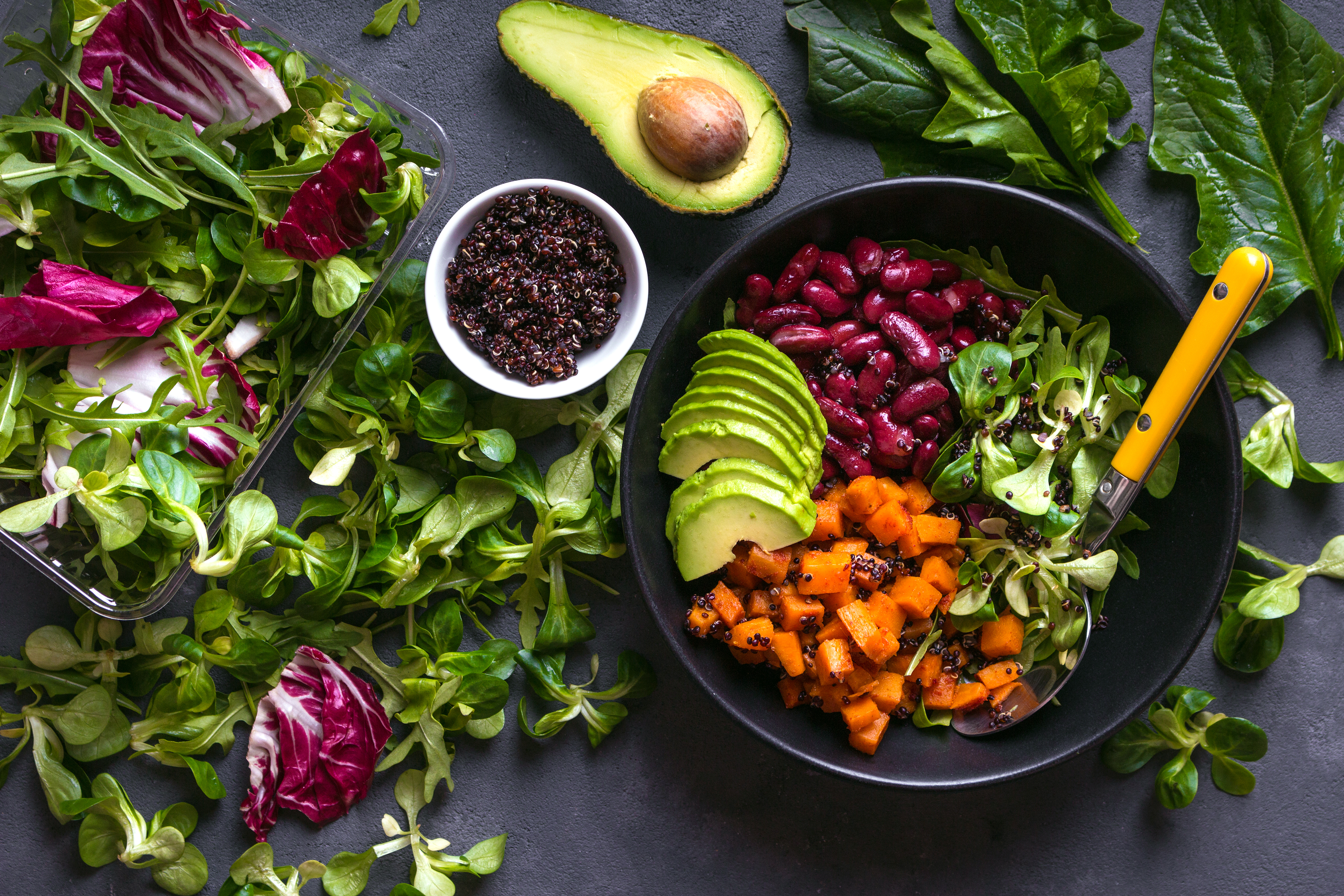Plant-based diets – a more healthful and sustainable way of eating?

Are you recommending plant-based diets to clients for health reasons as well as a reasonable alternative for a sustainable future?
Optimising health requires carefully targeted strategies. Which direction should be taken when clients present with multiple health issues, a scenario which is increasingly becoming the norm in clinic? Practitioners are uniquely placed to navigate and support at the outset of a client’s health quest to ensure that their journey is successful. From the beginning the correct test may be a vital diagnostic tool to support clinical protocols and encourage compliance.
We are facing a health crisis, and at no other time has preventative health action been more prescient. Published figures reveal that 89% of deaths in the UK are caused by non-communicable diseases, these include cardiovascular disease, cancers, chronic respiratory disease, and diabetes. And these conditions are, to a significant extent, preventable. If a third of all deaths in the UK are classed as premature and 40% of premature mortality is caused by preventable diseases then the costs, in human, social and economic terms, are largely avoidable (1).
Britain has the worst healthy life expectancy in Western Europe. The state of the UK’s poor health meant that we were inadequately prepared for COVID-19, experiencing higher deaths than most countries (2). We have the highest rates of obesity in Europe and those who are obese have a 40% greater risk of dying from COVID-19 (3). However, there is a wealth of published research evidencing that dietary and lifestyle changes improve our resilience to, and protection against, diseases including SARS-CoV-2 (4).
Fundamental change is challenging and requires multiple touch points, Government policies to date have not managed to turn the tide. Individual education, empowerment and ultimate responsibility is the key. Practitioners and clinicians understand that often small changes can make a disproportionate significance to health,and change requires both the will (motivation) and the way (knowledge) in equal proportions (5).
Keeping abreast of research and education to help design and target bespoke, practical protocols for each client will guide the way. We can directly address the four most important known modifiable risk factors for diseases, as identified by the World Health Organisation, being tobacco use, physical inactivity, the harmful use of alcohol and unhealthy eating.
However, the will to change is more complex, involving support and motivation, defined skills in themselves. We can directly support you as practitioners with relevant tests at the first touchpoint with clients by providing visual, diagnostic evidence and practical guidelines to encourage the will to change and maintain motivation when that initial ‘honeymoon’ of change begins to fade.
Why test?
Testing supports clinical decisions from the first consultation, providing diagnostic evidence of nutrient deficiencies or biochemical imbalances, strongly evidencing where nutritional changes and/or targeted supplements and interventions may help.
If we don’t test, are we making the wrong decisions for the right reasons? And how do we know that the functional foods, that we suggest for our clients as being ‘healthier’ alternatives, are beneficial and not detrimental?
In the laboratory we clearly see how eating trends are reflected in our test results. We are all influenced, consciously or subconsciously by trends which may influence clinical decisions. Journey back ten years to 2013 and the trends were for heritage grains such as quinoa, kamut, spelt and millet, and for everything gluten-free, for buying local, for ramen and the Paleo diet.
This year’s trend towards eating sustainably and in a climate-friendly fashion, including reducing the amount of meat we eat and buying in season and local, may become the permanent blueprint for the future. Globally, the market for vegan food products has surged by more than 980% over the last decade. Currently 4.5% of the UK population, over 3 million adults and children, eat a vegetarian or vegan diet for a variety of reasons, including:
- Environmental. In comparison to diets rich in animal products, plant-based diets more sustainable because they use fewer natural resources and are less taxing on the environment.
- Plant-based proteins produce 70 times less greenhouse gas emissions than an equivalent amount of beef and use 150 times less land. The National Food Strategy Report predicts we will be eating 30% less meat by 2030 (6).
- Financial. Food bills may be cut by a third adopting a plant-based diet (7).
- Health. Research has linked plant-based diets to lower rates of heart disease, type 2 diabetes, some cancers and with lower odds of moderate-to-severe COVID-19 (8).
Increasingly, practitioners are encouraging the adoption of diets, such as the Mediterranean diet and the DASH diet, mostly composed of fruits and vegetables, and it is important to evidence that any new dietary patterns being adopted are individually suitable.
Just because its plant based, doesn’t mean it’s healthy!
In the laboratory we are seeing a rise in secondary IgG immune responses to specific foods that are being used extensively in ultra processed (UP) vegan and vegetarian processed meals including fake meat and dairy alternatives. All UP foods are a risk factor for chronic diseases and low-grade inflammation (9). As with meat-containing UP foods, vegetarian and vegan UP foods may contain a similar high energy density, high sodium content, high fat and free sugar content, and contain high levels of additives, dyes and emulsifiers. They may be poor in vitamins and minerals as well as in dietary fibre. Those consuming a greater proportion of processed, plant-based foods are unlikely to benefit from the health benefits attributed to non-processed plant-based foods.
There is already an established body of evidence that has linked poor health with frequent consumption of UP foods, including vegetarian and vegan UP foods and researchers have identified that a greater understanding of plant-based foods, their degree of processing, nutritional profile, and adequacy of meal patterns is needed (10,11).
Well-designed vegan and vegetarian diets offer an abundance of antioxidant vitamins and phytochemicals, micronutrients and fibre providing numerous health benefits. Potential nutritional deficiencies when moving from a meat-eating diet to a plant-based diet, are well recognised, notably in zinc, iron, magnesium, omega-3, vitamin B12, iodine and high quality protein (12).
Other factors, recently highlighted, may need to be considered when switching to a predominantly plant based diet. Research, for example, has linked an increase in insecticides, organophosphates and pyrethroid exposure when changes were made from a habitual Western diet to a Mediterranean diet (13). This was not observed, however, in those eating organic produce.
So whatever dietary protocol you choose for each client, do also consider suggesting relevant tests. For example, if someone is following a vegan or vegetarian diet consider our food sensitivity panels to identify whether or not seemingly healthy foods may be contributing to their symptoms.
Remember we are also here to help you navigate your client’s results, considering their diet and lifestyle, and will come back to you within 24 hours, so please do not hesitate to contact our nutrition department at [email protected].
REFERENCES
- https://publications.parliament.uk/pa/ld201617/ldselect/ldnhssus/151/15109.htm
- Global age-sex-specific fertility, mortality, healthy life expectancy (HALE), and population estimates in 204 countries and territories, 1950–2019: a comprehensive demographic analysis for the Global Burden of Disease Study 2019.Lancet. 2020; 396: 1160-1203.
- Public Health England. Excess weight and COVID-19: insights from new evidence. https://www.gov.uk/government/publications/excess-weight-and-covid-19-insights-from-new-evidence. Date: 2020. Date accessed: December 1, 2020.
- Banerjee, A; et al. 2023. Functional Foods: A Promising Strategy for Restoring Gut Microbiota Diversity Impacted by SARS-CoV-2 Variants. Nutrients 2023, 15, 2631. https://doi.org/10.3390/nu15112631
- Berkman ET. The Neuroscience of Goals and Behavior Change. Consult Psychol J. 2018 Mar;70(1):28-44. doi: 10.1037/cpb0000094. PMID: 29551879; PMCID: PMC5854216.
- https://www.nationalfoodstrategy.org/the-report/
- https://www.thelancet.com/journals/lanplh/article/PIIS2542-5196(21)00251-5/fulltext
- Kim H, Rebholz CM, Hegde S, et al. Plant-based diets, pescatarian diets and COVID-19 severity: a population-based case–control study in six countries. BMJ Nutrition, Prevention & Health 2021;bmjnph-2021-000272. doi: 10.1136/bmjnph-2021-000272
- Tristan Asensi, M.; Napoletano, A.; Sofi, F.; Dinu, M. Low-Grade Inflammation and Ultra-Processed Foods Consumption: A Review. Nutrients 2023, 15, 1546. https://doi.org/10.3390/nu15061546).
- https://www.news-medical.net/health/What-are-the-Health-Effects-of-Ultra-Processed-Vegan-Foods.aspx.
- Monteiro CA, Moubarac JC, Cannon G et al (2013) Ultra‐processed products are becoming dominant in the global food system. Obesity Reviews 14: 21–8. [PubMed] [Google Scholar]
- O'Keefe JH, O'Keefe EL, Lavie CJ, Cordain L. Debunking the vegan myth: The case for a plant-forward omnivorous whole-foods diet. Prog Cardiovasc Dis. 2022 Sep-Oct;74:2-8. doi: 10.1016/j.pcad.2022.08.001. Epub 2022 Aug 6. PMID: 35944662.
- Rempelos L, Wang J, Barański M, Watson A, Volakakis N, Hoppe HW, Kühn-Velten WN, Hadall C, Hasanaliyeva G, Chatzidimitriou E, Magistrali A, Davis H, Vigar V, Średnicka-Tober D, Rushton S, Iversen PO, Seal CJ, Leifert C. Diet and food type affect urinary pesticide residue excretion profiles in healthy individuals: results of a randomized controlled dietary intervention trial. Am J Clin Nutr. 2022 Feb 9;115(2):364-377. doi: 10.1093/ajcn/nqab308. PMID: 34718382.








